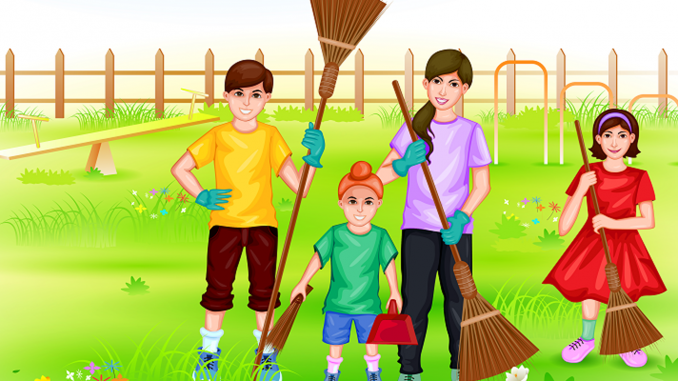Everyone likes a clean room, clean roads, clean water—clean environment. Cleanliness is next to godliness. The Father of the Nation, Mahatma Gandhi, even during the freedom struggle, never let go of his philosophy towards a hygienic environment. He even cleaned toilets, along with that he cleared away the dust from our thoughts that considered cleaning a menial task.
Recently, while traveling by the RTC bus, the lady sitting next to me leaned over me to spit outside the window. Not once, but four times. If people do not dirty their surroundings, then it reduces the need to clean. Prevention is better than cure. Every individual needs to understand this.
In urban areas, the biggest problem occurs during the rainy season. Some months back, there were sudden heavy downpours in our city. It resulted in the most gruesome sights. The roads were entirely flooded and sewage materials spilled out of the drains and onto the roads. I had to wade back home and upon taking off my footwear, my feet stank even after scrubbing them for cleanliness. The blackish color from alien contents of the road were dragged back home with me. Just think about the number of germs, and the number of diseases these will result into.
People in urban areas are seen defecating in the open, especially near these gutter areas. People spitting on the roads pose a huge problem. Imagine how you would feel if you stepped on people’s spit. In many countries like USA and China, fines have been imposed on people for spitting outdoors.
People also have the habit of spitting paan, gutka, tobacco especially in public places like railway stations. These stain walls and floors requiring manual cleaning. India has 407 railway stations, and among them many of the northern states’ railway stations have made their way into the dirtiest railway stations’ list.
The need for sanitation is rising especially in rural areas. I have attempted to create awareness amongst the villagers of all these pressing issues.
One of the most pressing problems in the rural areas is dung cakes. When we went to our house in the village in the holidays, we saw that that our newly plastered house walls were now plastered with dung cakes!! These wet, drying dung cakes attracted flies, worms… all sorts of insects and bugs, even reptiles like snakes. Due to this unsanitary practice, my entire family, especially my younger brother was down with mysterious black spots all over the body due to mosquito bites.
Many of the villagers are from economically backward backgrounds. Hence, they are unable to pool in resources to have a toilet constructed in their houses. They were initially hesitant but many villagers have come up to avail to the government programmes. Open defecation degrades human dignity, raises topics like molestation and debates caste-based professions.
India ranks first in the practice of open defecation with 626 million. India also houses about 97 millions of people who do not have access to clean drinking water. The UN World Water Development Report (2018) stated that over 80 percent of wastewater generated by society flows back into the environment without being treated or reused. I have been to places where there were no flushes in the toilets! Besides that, the sanitary napkins were placed in an open container just near the toilet seats. It is vital to have toilets as it reduces people mixing human waste with clean water which happens in open defecation near water bodies.
A study conducted in West Bengal and Tripura has shown that only 53% of Indians wash their hands after defecation. Not washing hands has resulted in the problem of diarrhea in children which has led to more than 1,600 deaths. In villages they use mud instead of soap to wash their hands after defecating outside. The biggest problem is people’s mindset that dirty hands don’t really have adverse effects on health. Due to this, people use water to wash their hands, and some people don’t even do that!
One of the first things, a child learns, is to wash their hands thoroughly to prevent germs. Basic sanitation practice is basic manners. We learn these manners starting from our first years in school, even before we learn to read and write fluently. We learn good habits from our social environment like washing our hands thoroughly before we eat. Nursery rhymes and poems can be used to create awareness about sanitation.
Ignaz Semmelweis brought a hygiene revolution by introducing mandatory hand-washing in his line of profession. Due to this practice, infant death rate decreased drastically. Very few adults are aware that washing hands itself is a thorough process. However, there are children who teach their elders that washing hands requires you to focus on the task at hand… literally! While washing your hand, you must wash the front and back of your fingers, the back of your hand, your palm, the area around your nails—these all require thorough cleaning. Every toilet stand’s door (especially public toilets) must have a poster reminding the person using the toilet to wash their hands thoroughly.
People consider donning grimy clothes as an unhygienic practice. My recent visit to a slum area brought forth images of many women washing clothes on roads which had open gutters on its side. Dirty clothes are washed on the pavement which pedestrians spit on or clear their nose on. Does washing clothes in such a scenario result in clothes becoming clean and germ-free?
Plant sanitation is another important aspect of our society. Today air pollution is a major reason for dirty and unhygienic surroundings, the dust settles onto windows and floors of one’s house too! Plant sanitation requires proper care of plants and removal of toxic wastes around them.
It is necessary to clean your entire house once in a while as the dust is, in the end, breathed by the residents who then suffer from various respiratory problems as well as eye and skin diseases. At home, we should clear the cobwebs from every nook and cranny and clean the blades of the fans on a weekly basis. Also, vegetables should be washed before being cooked.
Another important thing is water left out in the open especially overnight. This becomes a breeding ground for mosquitoes. We can set an alarm that rings to remind us to empty the buckets of their water, before going to sleep at night. As a preventive measure I always turn the water buckets upside down when they are not being used.
Road street vendors selling edibles like vegetables and fruits should be asked to use a transparent cover to protect them from the dust and smoke produced by the vehicles. It will also prevent bugs and flies from sitting on these goods.
Sanitation is an indispensable right and duty of every individual in the society. Let us all remember this.
Author Bio : Neha Yadav, 18 YRs girl from Visakhapatnam. A participant of International Essay Competition November.Email : nehayadav.itin@gmail.com.

















